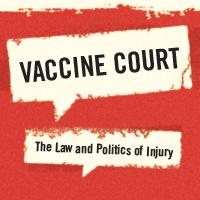Vaccine Court: The Law and Politics of Injury

-
Anna Kirkland, Arthur F. Thurnau Professor; Associate Professor of Women's Studies and Political Science; Associate Director, IRWG
-
Shobita Parthasarathy, Associate Professor of Public Policy and Women's Studies; Director, Science, Technology, and Public Policy Program
-
Peter D. Jacobson, Professor of Health Law and Policy, Director, Center for Law, Ethics, and Health

This panel of U-M faculty members will discuss the recent book, Vaccine Court: The Law and Politics of Injury (NYU Press, December 2016) by Anna Kirkland.
The so-called vaccine court is a small special court in the United States Court of Federal Claims that handles controversial claims that a vaccine has harmed someone. While vaccines in general are extremely safe and effective, some people still suffer severe vaccine reactions and bring their claims to vaccine court. In this court, lawyers, activists, judges, doctors, and scientists come together, sometimes arguing bitterly, trying to figure out whether a vaccine really caused a person’s medical problem.
In Vaccine Court, Anna Kirkland draws on the trials of the vaccine court to explore how legal institutions resolve complex scientific questions. What are vaccine injuries, and how do we come to recognize them? What does it mean to transform these questions into a legal problem and funnel them through a special national vaccine court, as we do in the U.S.? What does justice require for vaccine injury claims, and how can we deliver it? These are highly contested questions, and the terms in which they have been debated over the last forty years are highly revealing of deeper fissures in our society over motherhood, community, health, harm, and trust in authority. While many scholars argue that it’s foolish to let judges and lawyers decide medical claims about vaccines, Kirkland argues that our political and legal response to vaccine injury claims shows how well legal institutions can handle specialized scientific matters. Vaccine Court is an accessible and thorough account of what the vaccine court is, why we have it, and what it does.
Read the book's introduction.
